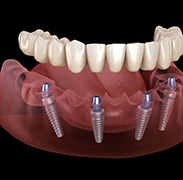Dentures – Estero, FL
Regain a Confident & Complete Smile

Surgery Certification

with Honors

Board of Prosthodontics
Why Smile Rejuvenations Is the Best Choice for Dentures
- Highly Trained & Experienced Team
- Variety of Options for Your Unique Needs
-
Dental Financing
Available
Who’s a Good Candidate for Dentures?

- Patients missing all their teeth
- Patients missing multiple teeth
- Patients with broken, chipped, or unhealthy teeth
- Patients that are not a good fit for dental implants
Effects of Missing Teeth

It’s important to understand what causes missing teeth and what can happen if you fail to replace them. According to the American College of Prosthodontists, the most common reasons tooth loss occurs is because of decay, gum disease, or physical injury. No matter what causes you to end up with gaps in your smile, it’s important to restore your grin as soon as possible.
Failing to replace your missing teeth can lead to several negative consequences. For example, the American Academy of Periodontology states that foregoing a method of tooth replacement can lead to issues like facial sagging, difficulty speaking, trouble eating, and lower self-esteem. To avoid these complications, you should seek a tooth loss solution as soon as possible.
What Qualifies You for Dentures?

Truth be told, dentures are a great option for patients suffering from varying levels of tooth loss. Those with sensitive teeth and a lot of decay can also benefit from dentures. However, anyone seriously considering dentures must have sufficient healthy gum tissue and jawbone. They must also be committed to their dental health and be willing to properly care for their new smile.
Keep in mind that the number of teeth you’re missing will ultimately determine which type of denture is best for you. There are many different options to choose from, like full dentures, partial dentures, implant dentures, and immediate dentures. Because traditional dentures are more cost-effective than other tooth-replacement methods, they’re a great choice for patients on a budget.
Alternative Tooth-Replacement Options

Did your dentist say you’re not a good candidate for dentures? No problem! You can explore other options, like dental implants. Unlike dentures, implants can replace the entire structure of missing teeth from the root up to the chewing surface. Their unique placement inside the jawbone allows them to provide unmatched durability and stability when chewing your favorite foods. Plus, your results will look so natural, no one will even tell you have had work done!
Denture Treatment Options

- Complete/Full Dentures
- Immediate Dentures
- Removable Partial Dentures
- Overdentures
- Hybrid Dentures
Denture Treatment Options
If you’re missing teeth, you’re not alone. Millions of Americans find themselves dealing with an incomplete smile every year. Thankfully, dentures from our Estero, FL dentist offer a quick, easy, and cost-effective way to regain the confidence and complete smile you deserve! At Smile Rejuvenations, we’re proud to offer several different treatments to fit your unique needs and preferences.
Complete/Full Dentures
When you think of dentures, the image that likely comes to mind is a set of complete or full dentures. This type of denture is for patients who have lost all their teeth in their upper jaw, lower jaw, or both. Full dentures feature a custom-made, gum-colored acrylic base that supports a full arch of beautiful replacement teeth. The close, precise fit of the base creates a strong natural suction that helps hold your new smile in place.
Removable Partial Dentures
For patients who still have some remaining healthy teeth, we may recommend a partial denture. This type of restoration can replace several missing teeth throughout the mouth. Like a puzzle piece, a partial denture is carefully designed to fit around and between healthy teeth to fill in the gaps in your smile. Plus, it’s removable for easy cleaning and maintenance!
Immediate Dentures
Typically, if you need to have teeth extracted before getting dentures, you’ll need to wait as your mouth heals before you can be fitted for your new smile. We understand this isn’t ideal or convenient for all our patients, which is why we also offer immediate dentures. To get immediate dentures, we’ll generally remove teeth farther back in the mouth while keeping the most visible ones. As you heal from that, we’ll fabricate your dentures. Then, when they’re ready, we’ll remove your front teeth and deliver your denture on the same day. This way, you won’t go any period of time without teeth in your mouth!
Overdentures
Dentures can be paired with dental implants as well. An overdenture is a denture that can snap onto several strategically placed dental implants throughout the mouth. This allows a patient to prevent jawbone deterioration, have a stronger bite, and enjoy teeth that don’t slip or pop out of place. However, overdentures are still removable for easy cleaning.
Hybrid Dentures
Another way dental implants can be used with dentures is via a hybrid denture. This type of denture is also anchored into place with several dental implants around the jawbone. However, unlike an overdenture, hybrid dentures are the most secure option because they can only be removed by a dentist. You’ll be able to wear your dentures 24/7 without any problems, and you’ll come visit us occasionally to have your new smile professionally cleaned.
How Dentures Are Made

If you’re thinking about replacing your missing teeth with dentures, you may be interested in their creation process. This will help you to appreciate your new smile that much more! Whether you are getting a partial or full denture, here’s how the magic happens!
What Are Dentures Made Of?

Dentures are made up of two different parts: the base of the denture and the replacement teeth. Here’s what each one consists of:
- Denture Base: This is the foundational structure that supports the replacement teeth. It can be made from a variety of materials, like acrylic, nylon, porcelain, resin, and metal. Full dentures are usually made from acrylic because they can be tailored to match your natural gum tissue for the best possible appearance.
- Replacement Teeth: The replacement teeth are usually made from resin or porcelain because they both have a natural appearance. However, porcelain is common because of its durability. Porcelain is usually recommended for full dentures because it can be abrasive on your adjacent teeth.
The Denture Creation Process

Every denture is custom-made for the patient’s mouth, so it requires a multi-step process. Here is what you can generally expect:
- Step 1: Your prosthodontist will take impressions of your upper and lower gums. This will be used to make a plaster model that will be a “replica” of your mouth. This model will be used to make sure that the final denture fits perfectly. During this time, measurements of your jaw will also be taken.
- Step 2: The cast will be sent to our in-house dental laboratory where your dentures will be made. First, we will make the wax version of the gumline.
- Step 3: The replacement teeth are set into place. A mechanical device, called an articulator, is used to attach the teeth to wax. Our technician will make minor adjustments by shaping and carving the wax to ensure that it looks like your gums.
- Step 4: Your prosthodontist will receive your wax dentures for a fitting. If they are approved, they are sent back to the in-house dental lab to complete the process.
- Step 5: Once they are back at the dental lab, the technician will boil the dentures to melt away the wax portions. To do this, the denture is placed in a flask. Plaster is poured in to maintain the shape of the dentures. The ensure flask is placed in hot water to melt the wax.
- Step 6: Holds are made in the teeth so they can be attached to the dentures. A liquid separator is added to the plaster layer to prevent the acrylic from sticking. Acrylic is injected into the flask to take the place of the wax.
- Step 7: The plaster is carefully removed using special lab tools to reveal the denture. Next, the dentures are placed in an ultrasonic bath to remove any remaining plaster.
- Step 8: Any excess acrylic will be cut away from the denture. After trimming, the denture is polished to perfection.
- Step 9: Once your denture is ready, you can return to our office for a fitting. Adjustments can be made as needed to make sure that everything looks and feels great!
Adjusting to Your New Dentures

If you feel some discomfort when you first get your dentures, don’t worry! This is completely normal. Initially, mild soreness and difficulty with speaking and eating are common. Your mouth will quickly adjust to your new dentures. They will eventually feel just like your natural teeth. You can speed up this adjustment period by exercising your facial muscles, eating soft foods, and experimenting with denture adhesive. If the discomfort persists, don’t hesitate to give us a call so we can help!
The Benefits of Dentures

- Durable, Reliable, & Natural Looking
- Fast & Cost-Effective Treatment
- Comfortably Eat, Smile, & Talk
The Benefits of Dentures
Dentures continue to be one of the most popular tooth replacement options, and it’s easy to see why. With no lengthy or invasive procedures, dentures are a relatively easy and fast solution for tooth loss that has the potential to last many years. Plus, thanks to modern dental technology and materials, they are now more comfortable, strong, and natural-looking than ever before!
Dentures Aftercare

Without a doubt, dentures can make your smile full and beautiful. (People wouldn’t bother with them otherwise.) Still, they need regular care to work correctly. Dentures won’t offer any perks if they don’t get proper upkeep. On the contrary, the prosthetics will fail and cause various dental problems. Luckily, Smile Rejuvenations is here to help: listed below are great tips on caring for dentures. To help your new teeth last, read them over and act accordingly! You can also learn more by calling our office.
Removeable Dentures

Remove After Eating
For starters, rinse your dentures after each meal. This habit keeps leftover food and plaque from clinging to them. As a result, it’ll lower your risk of dental issues.
At the same time, don’t use hot water for the rinses. Liquids at high temperatures warp denture material. If you act carelessly, a steamy rinse will distort your denture’s fit.
Clean Your Restoration
Of course, dentures need more than post-meal rinses. You should also clean them thoroughly every day. By doing so, you’ll remove germs and debris that a rinse can miss.
Daily denture cleanings are straightforward. First, take the restorations out of your mouth. You should then brush the prosthetics with a toothbrush and some hand soap. During the brushing, though, don’t include toothpaste; it’s abrasive and can damage dentures.
Once you’ve finished brushing, soak the dentures in a solution. Afterward, rinse them before putting them back in your mouth.
Keep Your Dentures Safe
While dentures are sturdy, they aren’t invulnerable. They can (and will) break when put under a potent force. So, take proper steps to keep them safe.
There are several ways to protect dentures. During daily cleanings, you could place a towel in the sink; it’d cushion the prosthetics from falls. Alternatively, you could store the dentures securely when they’re not in use. This setup ensures kids or pets don’t mangle your artificial teeth.
Remove Dentures When You Sleep
While they can look toothlike, don’t wear dentures overnight. It’s best if you remove them before bed. In particular, store the dentures in a soaking solution. Doing so keeps your new teeth moist while you sleep.
Ultimately, overnight denture use harms your health. It restricts your gums’ circulation and thus causes tissue irritation. Also, wearing dentures to bed raises your tongue’s plaque levels and pneumonia risk.
Notice Changes
As best you can, monitor your dentures and your mouth. Either could develop changes that your dentist should address. Mouth sores, gum irritation, and infections, especially, would need urgent care.
Perhaps most crucially, see a dentist if your dentures fit poorly or get damaged. Trying a personal fix won’t help matters. On the other hand, a dentist can refit or even replace the prosthetics.
All-on-4 Dentures

All-on-4 dentures rely on dental implants, so they have unique care steps. These include:
- Twice-Daily Brushing – Like natural teeth, brush All-on-4 dentures twice daily with a soft-bristled toothbrush.
- Once-Daily Flossing – Floss All-on-4 dentures once daily. To floss beneath them, consider using store-bought flossers.
- Clean Between Spaces – Get a sulcus brush to clean between your dentures and gums. (This kind only has one-third the width of normal toothbrushes.)
- Mouth Rinses – To prevent tartar growth, rinse your mouth with mouthwash daily.
Dentures FAQs

- Am I Too Young For Dentures?
- When Can I Get Dentures After Having My Teeth Pulled?
- Is It Hard to Eat With Dentures?
- Are Dentures Uncomfortable?
- What Do I Do If My Dentures Won’t Stay In Place?
Am I Too Young For Dentures?
It’s no secret that tooth loss becomes more common the older you get. However, people can lose their teeth at any stage of life for a variety of reasons! Fortunately, you can’t be too young for dentures. Our lifelike restorations are custom-made to fit your unique smile regardless of your age.
When Can I Get Dentures After having My Teeth Pulled?
We’ll do everything we can to preserve your remaining healthy teeth, but there are certain cases where tooth removal is necessary before getting dentures. In order to fit snugly, the base of your dentures will be created based on impressions of your mouth. To ensure these impressions are accurate and that your dentures fit properly, it’s important that you’ve completely healed from any preliminary tooth extractions. In many cases, you’ll need to wait several weeks or months depending on your unique situation.
Is It Hard to Eat With Dentures?
When you first begin wearing dentures, we highly recommend sticking to a soft-foods diet as you get used to eating with them. The adjustment period will vary from patient to patient, but many people need about a month of practice before fully getting used to their dentures. In the meantime, you can move this process along by chewing evenly on both sides of your mouth, taking small bites, and gradually eating harder and stickier foods as you feel ready to do so.
Are Dentures Uncomfortable?
It’s not unusual to feel some discomfort as your mouth adjusts to your new dentures. Your jaw muscles may ache a little as you move your mouth more using your dentures. Plus, your gums will need to adjust to the presence of your new restoration as well. Some gum irritation is to be expected at first, but the tissue will become stronger over time. Once you’ve adjusted to your new smile, your dentures should NOT feel uncomfortable. If they do, or you begin to notice gum sores or jaw stiffness, call us right away. There may be an underlying oral health issue we need to address, or it may be time to replace your dentures with a set that fits better.
What Do I Do If My Dentures Won’t Stay In Place?
In the beginning of your journey with dentures, you may need to use a dab of denture adhesive to keep your new smile in place as you adjust to it. Once you’ve gotten used to them, your dentures should feel stable and reliable for many years. However, at some point, they will need to be replaced. Your mouth naturally changes shape overtime, which will cause your dentures to lose their precise fit and suction. Should your dentures begin to slip or pop out of place, don’t hesitate to give us a call! We’ll schedule an appointment for you and evaluate your dentures. We may be able to readjust them for a better fit, or we may recommend having them replaced so you can enjoy the stable smile you deserve.
Dental Implants Cosmetic Dentistry Sedation Dentistry View Our Services

